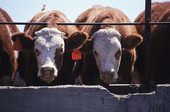
TUESDAY, July 15, 2014 (HealthDay News) — Children raised on dairy farms are much less likely to develop allergies than other youngsters, a new study finds.
Researchers tracked children who lived in rural areas of Sweden, half of them on dairy farms, from birth until 3 years of age. Children on dairy farms had one-tenth the risk of developing allergies as other rural youngsters.
“Our study also demonstrated for the first time that delayed maturation of the immune system, specifically B-cells, is a risk factor for development of allergies,” researcher Anna-Carin Lundell, of the University of Gothenburg, said in a university news release.
She and her colleagues found that children who had allergies at ages 18 to 36 months had higher levels of immature B-cells in their blood at birth and during the first month of life.
Further research is needed to learn more about the association between delayed B-cell maturation early in life and increased risk of developing allergies, the researchers said. While a link was found between fewer allergies and growing up on dairy farms, it didn’t prove a cause-and-effect relationship.
“We need to identify the specific factors on dairy farms that strengthen protection against allergies and appear to promote maturation of the immune system as early as the fetal stage,” Lundell said.
The study was recently published in the Journal of Immunology.
Allergy rates in Western nations have risen dramatically in recent years. One widely held explanation for this trend is that children are less exposed to microorganisms and have fewer infections, resulting in delayed maturation of their immune system, according to background information in the news release.
More information
The U.S. National Library of Medicine has more about allergies.
Copyright © 2026 HealthDay. All rights reserved.

